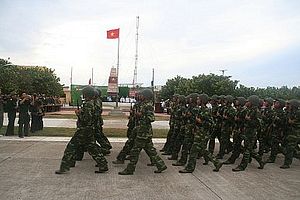This week, an Indian naval ship paid a port visit to the Vietnamese city of Ho Chi Minh city. While this is just one of a series of scheduled defense engagements by the two sides expected this year, it has nonetheless once again put the spotlight on the growing security ties between the two Asian powers.
As I have noted before in these pages, Vietnam and India have looked to advance their existing defense relationship as part of their wider ties, which were elevated to a comprehensive strategic partnership in 2016. Defense ties have grown in recent years to include not just the traditional components in this realm of ties like exchanges and port calls but also the training of personnel, capacity-building funding and equipment, and coast guard collaboration.
That trend has continued into 2018 as well, from high-level visits – including that of then-Vietnamese President Tran Dai Quang’s visit to India in March and the visit of Indian Defense Minister Nirmala Sitharaman to Vietnam in June – as well as maritime engagements such as when three Indian naval ships paid a visit to Da Nang in May (See: “What’s Next for India-Vietnam Defense Relations?”).
This week, the relationship was in the headlines again with the visit of an Indian naval ship to Vietnam. The Indian Navy Ship INS Rana docked at Ho Chi Minh City Port on September 27 for a scheduled four-day visit to the city. The visit followed a number of such visits by key Asian states in September, including a South Korean destroyer and a Japanese submarine – a notable first (See: “Why Japan’s First Submarine Visit to Vietnam Matters“).
The port visit itself by the Indian vessel includes a number of interactions, including courtesy calls to the leadership of the Ho Chi Minh City People’s Committee and Military Region 7, sports and other cultural exchange activities with Vietnamese personnel, and ship tours of the INS Rana by students and other visitors. But the highlight is the holding of communications and coordination exercises at sea between vessels of both countries. Vietnam’s defense ministry said the visit and its interactions were designed to “cement the defense relationship” between the two countries.
Unsurprisingly, no further specifics were announced relating to the visit of the ship, which was captained by Captain Atul Deswal and 400 officers and sailors on board. And, to be sure, as I have observed previously with respect to such interactions in the bilateral relationship, inroads both sides are continuing to make should not obscure the broader realities and structural constraints that exist. Nonetheless, engagements such as this one continue to provide opportunities for both sides to advance this aspect of ties within wider and broader trends in the region.
































